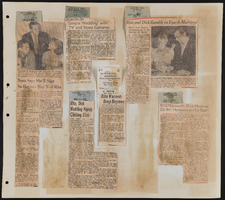Search the Special Collections and Archives Portal
Search Results

Transcript of interview with Oliver Crickman by William Hawley, March 3, 1979
Date
Archival Collection
Description
On March 3, 1979, William Hawley interviewed Oliver Crickman (born 1933 in Apex, North Carolina) about his experiences from living in Nevada and working in restaurants. Crickman first describes his background and his first occupations prior to starting as a cook in Las Vegas restaurants. He then explains how he gradually moved from the position of cook’s helper to sous chef and his then-current position of executive chef at the Royal Inn. Crickman goes into detail about the operation of those restaurants and other Las Vegas Strip and Downtown Las Vegas properties, and he describes the demographics of cooks as well as how the hospitality industry has changed over time. The latter part of the interview involves a discussion of Crickman’s various residences in Las Vegas over time, the extent of crime, the first places to shop, and a brief discussion on mobile homes.
Text

Transcript of interview with Gil Cohen by Claytee White, August 5, 2014
Date
Archival Collection
Description
Interview with Gil Cohen by Claytee White on August 5, 2015. In this interview, Cohen discusses growing up in Las Vegas and attending University of Nevada at Reno. He returned to Las Vegas to join the management training program at the Stardust. He talks about his friendships with Moe Dalitz and Carl Cohen, and his interest in golfing. He also discusses corporate ownership of casinos, unions, and his experiences working at different Strip hotels.
Gil Cohen came to Las Vegas in 1957, when was ten years old, when his father, Yale Cohen, was recruited by Moe Dalitz to work at the Stardust Hotel and Casino. Cohen graduated from University of Nevada Reno, and started working at the Stardust through the management-training program. In 1975, he was made hotel manager, his first of many leadership positions in Strip properties, which have included the Dunes, Aladdin, Hacienda and Monte Carlo, where he currently works as a casino host.
Text

Interview with Michael Bordner, June 8, 2005
Date
Archival Collection
Description
Text
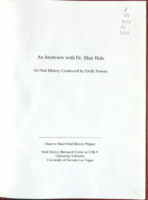
Transcript of interview with Blair Hale, by Emily Powers, June 16, 2006
Date
Archival Collection
Description
Text
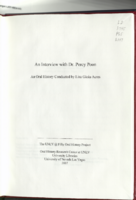
Transcript of interview with Dr. Percy Poon by Lisa Gioia-Acres, February 5, 2007
Date
Archival Collection
Description
Text
Bill Willard Papers
Identifier
Abstract
This collection is comprised of the personal papers of noted Las Vegas entertainment writer, producer, and critic Bill Willard, which date from 1887 to 1999. It contains material on his father's theater and political involvements as well as Willard's early childhood and high school years. His time in the United States Army is chronicled by the editorials and correspondence he wrote. His papers trace his continued involvement in writing, entertainment, and art which culminated in his direction of the Arnold Shaw Popular Music Research Center. The collection also includes pictures of his artwork, articles he wrote for various newspapers and magazines, scripts, skits, jokes, awards, over 700 audio cassette recorded interviews done for the "Rap with the Artist" series, and personal memorabilia.
Archival Collection
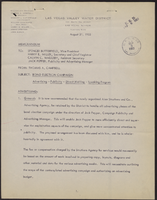
Memo from Thomas A. Campbell to Spencer Butterfield and others about the bond election campaign, August 31, 1953
Date
Archival Collection
Description
Details of advertising campaign to promote the bond election
Text
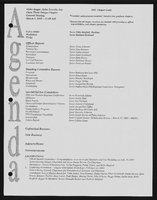
Alpha Kappa Alpha Sorority, Theta Theta Omega Chapter meeting agendas
Date
Archival Collection
Description
From the Alpha Kappa Alpha Sorority, Incorporated, Theta Theta Omega Chapter Records (MS-01014) -- Chapter records file.
Text
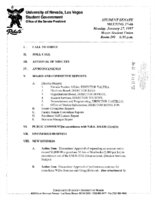
Meeting minutes for Consolidated Student Senate University of Nevada, Las Vegas, January 27, 1997
Date
Archival Collection
Description
Text

